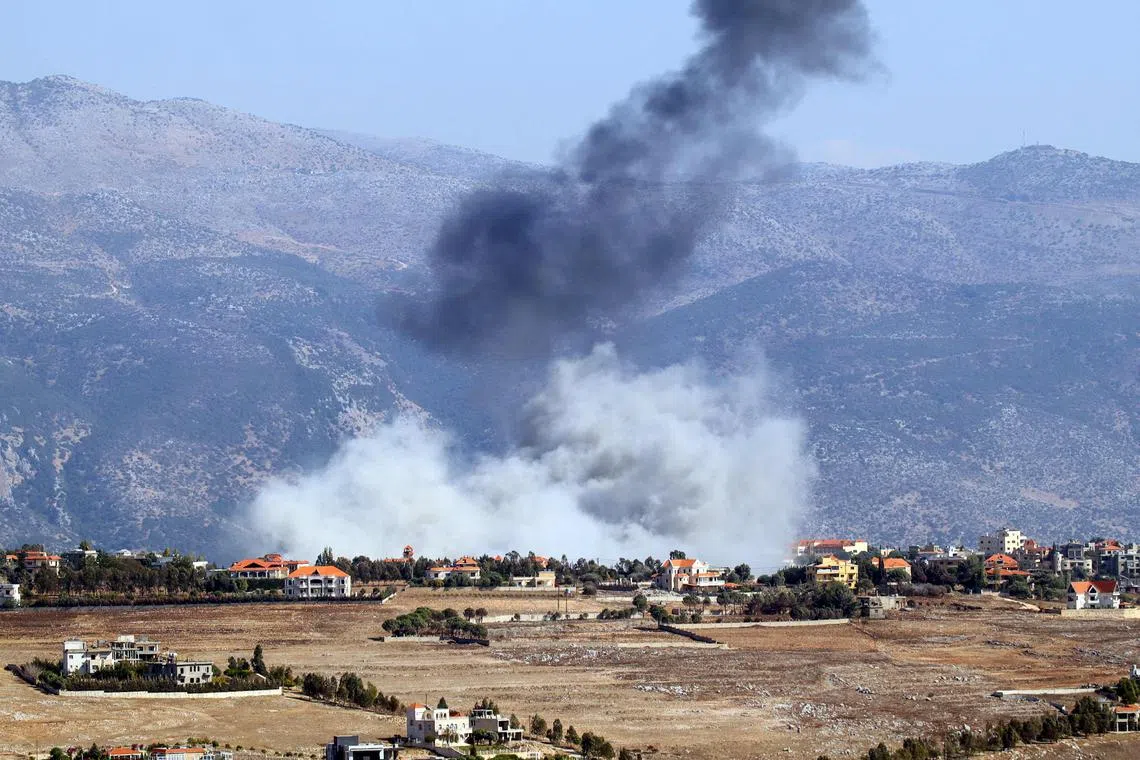Hezbollah seeks ceasefire as Israel sends more troops to Lebanon
Sign up now: Get ST's newsletters delivered to your inbox

Smoke rising from the site of an Israeli air strike that targeted the southern Lebanese village of Khiam on Oct 8.
PHOTO: AFP
BEIRUT - The militant group Hezbollah on Oct 8 left the door open to a negotiated ceasefire after Israel pounded more targets and sent more troops to Lebanon, as the broadening war in the Middle East grinds on to a second year.
In a 30-minute televised speech, Hezbollah deputy leader Naim Qassem said he supported attempts to secure a truce and, for the first time, did not mention the end of war in the Gaza Strip as a precondition to halting combat on the Lebanon-Israel border.
He said Hezbollah was backing efforts by Lebanon’s Speaker of Parliament Nabih Berri to secure a halt to the war.
“We support the political activity being led by Berri under the title of a ceasefire,” Qassem said.
It was not clear whether this signalled any change in stance after a year in which the group has said it is fighting in support of Palestinians in Gaza caught in a war between Israel and Hamas, and that it would not stop without a ceasefire in Gaza.
Speaking from an undisclosed location, he said the conflict between Hezbollah and Israel was a war about who cries first and Hezbollah would not cry first. He added that the group’s capabilities were intact despite “painful blows” from Israel.
Qassem said: “We are striking them. We are hurting them and we will prolong the time. Dozens of cities are within range of the resistance’s missiles. We assure you that our capabilities are fine.”
‘Battered and broken’
But Israel’s Defence Minister Yoav Gallant on Oct 8 said Hezbollah has been reduced to a “battered and broken organisation”.
In a briefing with the Israeli military’s northern command, he said that Hezbollah now lacks “significant command-and-fire capabilities” and that it has a “disintegrated leadership” following the death of the group’s charismatic leader, Hassan Nasrallah.
Mr Gallant said Nasrallah’s successor, Hashem Safieddine, “ seems to have been eliminated
The Israeli military said on Oct 8 that it has begun ground operations in south-west Lebanon and expanded its incursions to a new zone to further weaken Hezbollah.
Israel continued pounding the densely populated neighbourhoods south of Beirut that are a Hezbollah stronghold. The explosions could be heard from kilometres away.
Israel’s military said Suhail Hussein Husseini, a senior Hezbollah member responsible for the group’s budgeting and logistics, was killed in one of the air strikes.
Hezbollah responded by firing about 135 rockets towards northern Israel as at mid-afternoon on Oct 8.
‘Battlefield will decide’
Qassem said Israel has yet to advance after ground clashes that broke out in southern Lebanon a week ago.
“In any case, after the issue of a ceasefire takes shape and once diplomacy can achieve it, the other details can be discussed and decisions can be taken,” he said.
“If the enemy (Israel) continues its war, then the battlefield will decide.”
Hezbollah was drawn into a war with Israel after Hamas raided border towns in southern Israel
Israel responded to that attack by tearing across Gaza. In the 12 months since then, it has reduced large swathes of the enclave to rubble. That relentless offensive against Gaza has so far killed close to 42,000 Palestinians.
Hezbollah, in solidarity with Hamas, began raining rockets across northern Israel.
Iran, Israel’s arch-foe which arms and backs both Hamas and Hezbollah, was inevitably drawn to the conflict as well.
In response to Israel’s killing of Hezbollah’s and Hamas’ leaders, it fired a barrage of ballistic missiles
Israel has vowed to retaliate, planning its own strikes on Iran’s oil and nuclear facilities.
On Oct 8, Iran’s Foreign Minister Abbas Araqchi warned that any Israeli reprisal would be met with retaliation. He is visiting Saudi Arabia and other countries in the Middle East this week.
In a video on state media, he said the aim of his trip was to discuss ways “to prevent the shameless crimes of the Zionist regime in Lebanon in continuation of the crimes in Gaza”.
Gulf states have sought to reassure Iran of their neutrality in the Iran-Israel conflict.
‘Spiral of doom’
UN officials, meanwhile, voiced concern on Oct 8 that the same methods of warfare used by Israel that caused high civilian death tolls and widespread destruction in Gaza are now being repeated in Lebanon.
Israel’s air strikes against Hezbollah in the past two weeks have already killed over 1,000 Lebanese and displaced millions.
“It is in my mind, from the time I am awake until the time I sleep, that we could go into the same sort of spiral of doom, and we need to do everything we can to stop that from happening in this particular crisis,” said World Food Programme’s director in Lebanon Matthew Hollingworth.
He expressed “extraordinary concern for Lebanon’s ability to continue to feed itself” because of the impact of the fighting on food production.
More than 18 sq km of cropland has been burned over the past year, most of it in the last few weeks, in fires started by explosions, he told reporters.
More than 116 sq km of some of the most productive farmland has been abandoned because of the conflict, he added, threatening harvests of such crops as olives, citrus fruits and bananas.
A World Health Organisation (WHO) official said nine hospitals in Lebanon had been shut or partially shut, a pattern that has also occurred in Gaza.
Mr Ian Clarke, the WHO’s deputy incident manager for Lebanon, warned of disease outbreaks in Lebanon due to crowded conditions in displacement shelters and hospital closures as medics flee Israel’s assaults. REUTERS


